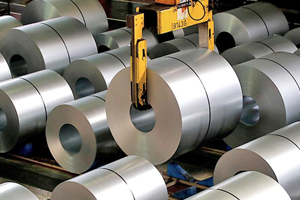Difference between Type 1 (T1) and Type 2 (T2) of aluminized steel
First of all, let us take a look at the past and present of the continuous hot dip process: In 1930-1931, the Sendzimir method was born, and the emergence of the continuous hot dip galvanizing process marked the official beginning of the era of large-scale industrial production of coated steel. From 1939 to 1940, based on the Sendzimir method, the American Armco Company developed aluminized steel plates. In the following 50 years, aluminized steel plates were not widely used because of their poor processing performance, that is, the contact between molten aluminum and steel base quickly forms Fe-AI metal compounds. This alloy is hard and brittle, which will seriously affect the plastic processing formability of the aluminized steel plate! In 1999, ArcelorMittal successfully developed aluminum-silicon coated steel plates, which solved the above-mentioned defects by adding a certain proportion of silicon to the coating to further improve the processability, heat resistance and corrosion resistance of the steel plates.
In 2006, the ASTM A463 standard appeared, and Type 1 of aluminum-silicon alloy coating and Type 2 of pure aluminum coating also officially appeared. T1 coating is usually 80-150 grams/square meter, and the silicon content is in the range of 5-11%. The lowest value of pure aluminum coating T2 in this standard is 200 grams/square meter! Currently, there are about 12 aluminized steel plate manufacturers in the world, and most of them produce T1 standards. The latest survey found that there may not be more than 2 companies, or even only one, that can produce T2 standards... Moreover, because the order quantity is small, it is very difficult to organize production, the delivery time is very unstable, and the price is seriously beyond the market's ability to accept it. ! This has led to more and more projects replacing T2 with T1.
So can T1 replace T2? Is this scientific? Next we will analyze three aspects of metal protection:
1. Weather resistance: Strictly speaking, aluminum forms alumina during the oxidation process, and silicon forms silicon oxide. The stability of alumina is slightly better than silicon oxide, but if you want to destroy the chemical bond between the two, the temperature At least above 1700 and 2050 degrees Celsius. Therefore, in general application scenarios, there is no obvious difference in weather resistance between the two, because the energy required to destroy Al-O and Si-O is too great! If you have to make a comparison, T1 is slightly weaker than T2 in this aspect.
2. Chemical resistance: Because aluminum is an active metal and silicon is a non-metal, aluminized silicon steel plates have better chemical resistance than pure aluminum coatings in acidic and alkaline environments. Therefore, in this aspect , T1 is obviously better than T2!
3. Mechanical resistance: Because of the presence of silicon, the aluminum-silicon coating not only does not form a rich Fe-Al hardened layer on the surface of the steel base, which makes the aluminum-silicon steel plate have better processability, but also makes the alloy coating slightly harder than pure aluminum coating, so in this aspect, T1 is obviously better than T2!
In practical applications, weather resistance is relatively complex. It is often not just a simple oxidation environment or a high-temperature environment, there may be some acidity and alkalinity. Therefore, we believe that as long as the coating thickness of T1 is increased to reach the standard of T2, T1 can replace T2 in many industries such as petrochemical and new energy. However, T2 may not be able to replace T1, because the processability of T2 is the core factor limiting its development, this is also the core factor why the demand for T1 has grown rapidly in recent years!
The above is the conclusion that our company has reached based on industry characteristics, material characteristics, element properties, etc. after consulting and researching various manufacturers and consulting a large number of literatures! And we boldly predict that pure aluminum T2 coating may be discontinued and eventually disappear due to its very high price, difficulty in organizing orders, long delivery time and other factors. Information above is for reference only!
MESCO STEEL is always committed to new technologies, new materials, and new processes. If you have any needs or doubts in this area, welcome to communicate and discuss!
MESCO STEEL is a professional steel products supplier.
Specialized in #Hot Rolled Steel, #Cold Rolled Steel, #Wear Resistant Steel, #Zn-Al-Mg Coated Steel, #Stainless Steel, #Aluminized Steel, #Powder Coated Steel, #Enamelled Pressed Steel, #PVC Laminated Steel, #Silicon Steel, #Tin Plate, #Aluminum Coil, #Steel structure, #Galvanized Steel, #Galvalume Steel, #PPGI, and #PPGL products.
The Largest Private Steel Supplier In Northeast China.
16 years, 78 countries, 480+ clients domestically and worldwide! No Stain In Reputation.
Wind Vane Company of price in mainstream media.
Council member enterprise of Chinese Steel Export Union.
Council member enterprise of Chinese Northeast Steel Structure Union.
Chinese top 20 coating steel supplier in 2019.
Chinese top 100 steel steel supplier in 2020.
Chinese top 30 coating steel supplier in 2020.

